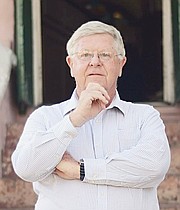By Dr Mike Neville
The stunning beauty of the sparkling sands and the turquoise waters attracts millions of visitors to these shores.
There are, of course, some dangers to be found under this azure water paradise: the majestic sharks and the scintillating speed of the barracudas mark them as predators to be respected.
The moray eel, however, seems to resemble the threats that we are facing on dry land. It is a fearsome creature that lurks, well hidden, in the coral reefs. The eel even looks evil as it darts from hiding to attack its prey. It has two jaws: the first snaps shut and holds its prey while the second begins to tear away the flesh. It wraps its body around the honeycomb coral making it impossible to pull out; the blood of the eel is poisonous and whilst heat can destroy the toxin many fishermen do not like to even cut up the body as the blood can cause festering wounds to develop on them.
I feel this resembles the cowardly murderer who shoots from a moving car or hides at night to ambush their unsuspecting targets. Strength and bravery are non existent; they only feel big and powerful behind the barrel of a gun. They do not even have the courage to behave like a shark and attack in the open.
What has turned this paradise into a crime capital?
Clearly, many of the miscreants must be unable to have feelings for others, unable to have empathy for the suffering that they cause. This comes largely from an upbringing that has been devoid of love, a toxic mix of brain dysfunction and maternal deprivation. There has also been a tacit societal approval of much of this behaviour, what we might describe as the politics of hate.
A great Muslim scholar, Ibn Rushd, who was born in Cordoba in 1126, said: “Ignorance leads to fear, fear leads to hate and hate leads to violence, this is the equation.”
It used to be fairly simple to create ignorance as education could be limited and diluted. The newspapers and the state controlled the media. It is now more subtle; many people look for their own news on social media or via search engines on the internet. The problem is that mass media can create what has become known as ‘alternate facts’; the use of web robots (bots) can do simple, structurally repetitive tasks much faster than humans. This allows false stories to be pushed and enables them to pop up first on your search engine.
The stories that create fear, whilst generally untrue, have had an effect on our opinions and even on elections around the globe. It seems easy get people to fear and then hate minorities whether by race or religion. Crime is another perfect target; we are already afraid so the fire is ready to be stoked by lurid stories. The solutions, however, are not usually based on international research or the results of examination of local programmes but rather a clamour for more violence. I can never accept the axiom that if society meets violence with more violence, then violence will disappear.
A more sinister and disturbing delivery of this societal hate is the blaming of the victim. A woman who has been raped is viewed as having caused the violence or it must have been consensual!
The myth that all murder victims are just bad men killing bad men should be disturbing and painful to all society; it is simply not true. The longer we hide behind these “alternative facts” the more difficult it becomes to solve the crime problem.
It is perhaps wishful thinking to expect all leaders to tell the truth but the truth about crime and societal issues must be reported by the media. There is increasing research that shows how domestic violence and stalking behaviours can lead to horrendous consequences; it is time to take early warning signs seriously. We must also shine a light on the seedy linkages between the criminals and the seemingly respected groups within society.
Martin Luther King said: “Darkness cannot drive out darkness; only light can do that. Hate cannot drive out hate; only Love can do that.”
NEXT WEEK: as the election looms, a look at the historical impact of mental health on world leaders
• Dr Mike Neville is a forensic psychiatrist who has practiced for more than 40 years in The Bahamas, working at Sandilands, the prison and in private practice. Comments and responses to mneville@tribunemedia.net.





Comments
banker 8 years, 9 months ago
Question for Dr. Mike. Does it take more effort to love someone than to hate someone? It seems that hate can arise instantly for the smallest of reasons. It seems like hate is the proverbial thin-slicing that Gladwell talks about where it is an almost simultaneous decision often unconcious. If so, then it would appear that the human organism is more prone to hate than to love.
Sign in to comment
OpenID